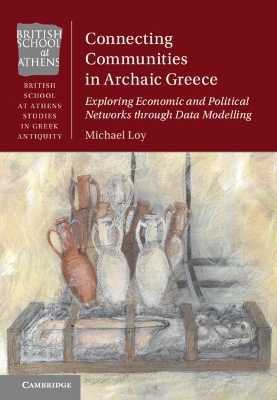
Connecting Communities in Archaic Greece
Exploring Economic and Political Networks through Data Modelling
Seiten
2023
Cambridge University Press (Verlag)
978-1-009-34381-7 (ISBN)
Cambridge University Press (Verlag)
978-1-009-34381-7 (ISBN)
A new history of Greece in the seventh and sixth centuries BC written for the twenty-first century. It brings together archaeological material from over 100 years, employing experimental modelling techniques from the digital humanities to reveal new patterns about how Greece's first city-states traded with one another and made alliances.
This is a new history of Greece in the seventh and sixth centuries BC written for the twenty-first century. It brings together archaeological data from over 100 years of 'Big Dig' excavation in Greece, employing experimental data analysis techniques from the digital humanities to identify new patterns about Archaic Greece. By modelling trade routes, political alliances, and the formation of personal- and state-networks, the book sheds new light on how exactly the early communities of the Aegean basin were plugged into one another. Returning to the long-debated question of 'what is a polis?', this study also challenges Classical Archaeology more generally: that the discipline has at its fingertips significant datasets that can contribute to substantive historical debate -and that what can be done for the next generation of scholarship is to re-engage with old material in a new way.
This is a new history of Greece in the seventh and sixth centuries BC written for the twenty-first century. It brings together archaeological data from over 100 years of 'Big Dig' excavation in Greece, employing experimental data analysis techniques from the digital humanities to identify new patterns about Archaic Greece. By modelling trade routes, political alliances, and the formation of personal- and state-networks, the book sheds new light on how exactly the early communities of the Aegean basin were plugged into one another. Returning to the long-debated question of 'what is a polis?', this study also challenges Classical Archaeology more generally: that the discipline has at its fingertips significant datasets that can contribute to substantive historical debate -and that what can be done for the next generation of scholarship is to re-engage with old material in a new way.
MICHAEL LOY is a Leverhulme Early Career Fellow in the Faculty of Classics at the University of Cambridge. Previously he was Assistant Director of the British School at Athens (2019–2022). As a field archaeologist, he has over ten years of experience working on projects in Greece, Britain and Turkey. He is currently co-director of the West Area of Samos Archaeological Project (2021–2025).
1. Introduction; 2. Economic networks: the transport of heavy freight; 3. Economic networks; commodities and semi-luxuries; 4. Entangled networks: the transfer of technical knowledge; 5. Political networks: expressions of political affiliation; 6. Political networks: state alliance and amphiktyonies; 7. Conclusions.
| Erscheinungsdatum | 04.08.2023 |
|---|---|
| Reihe/Serie | British School at Athens Studies in Greek Antiquity |
| Zusatzinfo | Worked examples or Exercises; 10 Maps; 15 Halftones, color; 15 Line drawings, color; 35 Line drawings, black and white |
| Verlagsort | Cambridge |
| Sprache | englisch |
| Maße | 176 x 250 mm |
| Gewicht | 810 g |
| Themenwelt | Geisteswissenschaften ► Archäologie |
| Geschichte ► Allgemeine Geschichte ► Vor- und Frühgeschichte | |
| Geschichte ► Allgemeine Geschichte ► Altertum / Antike | |
| ISBN-10 | 1-009-34381-5 / 1009343815 |
| ISBN-13 | 978-1-009-34381-7 / 9781009343817 |
| Zustand | Neuware |
| Informationen gemäß Produktsicherheitsverordnung (GPSR) | |
| Haben Sie eine Frage zum Produkt? |
Mehr entdecken
aus dem Bereich
aus dem Bereich
Schulbuch Klassen 7/8 (G9)
Buch | Hardcover (2015)
Klett (Verlag)
31,50 €
Buch | Softcover (2004)
Cornelsen Verlag
25,99 €



